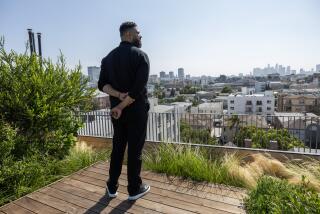Family Is Home for Holidays With Move From Shelter to Apartment
- Share via
For nearly a year, Claudia and Jose Cruz prayed for a home.
Forced to live in a shelter after Jose’s work hours were reduced, making it impossible for them to pay their rent, the Cruzes tried for months to find an apartment that their bare-bones budget could support.
The task seemed nearly impossible and the situation grew more urgent this month as their allotted three months in the shelter drew to a close.
The couple’s prayers were answered Tuesday in the form of an affordable apartment in a newly constructed building in North Hollywood--just in time for Christmas.
“This is a gift that God gave me and I am grateful,” Claudia Cruz said, her eyes welling with tears as she held her 9-month-old son, Michael. “We had no idea where we were going to go,” she said. “It’s a special Christmas for me.”
The Cruzes began moving Tuesday into Gentry Village North, a six-unit transitional housing development for homeless families built by the L.A. Family Housing Corp.
At a dedication ceremony Tuesday, Assemblyman Richard Katz (D-Sylmar) called the development “a model for the future” that showed government how the problem of homelessness could be solved. “A large part of the solution lies within these walls and how these walls were constructed,” Katz said while standing in front of the complex.
Gentry Village North in the 6800 block of Gentry Avenue was financed entirely with private funds and was finished in just 90 days, said Arnold Stalk, executive director of the Los Angeles Family Housing Corp.
The corporation is a nonprofit, private housing development organization founded in 1983 to build and manage housing for homeless and very low-income families in Los Angeles County. In addition to housing, the corporation offers health-care services, child-rearing courses, employment training, nutrition classes and a literacy program. The corporation has an annual operating budget of $2.5 million and is supported by private donors and grants from the federal Department of Housing and Urban Development, the state and the city of Los Angeles. Its major donor is the Audrey and Sydney Irmas Charitable Foundation.
Corporation officials estimate that by the end of 1992 the corporation will be able to provide housing for nearly 1,000 people each night through its various housing units.
Because the $400,000 construction cost of Gentry Village North was paid with private funds, however, the corporation did not have to go through the “bureaucratic red tape and endless reviews” that often slow government-funded projects and cause administrative costs to rise, Stalk said.
Construction was carried out by less expensive non-union labor, which could not have been used in a government-funded project, he said. Money was also saved by making the units smaller than most apartments, Stalk said.
“We’re trying to solve a housing crisis,” Stalk said. “We believe this is a way to do it.”
Still, he said, finishing the project in 90 days required a great deal of planning, and many long days.
“It’s like an auto-assembly line,” Stalk said. “If it’s planned in the right way, the car comes out right.”
Those on the “assembly line” sometimes worked 18-hour days to finish the project on time. Even artist Gary Soszynski, who painted a colorful mural of rainbows and children on the wall surrounding the building, had to work at breakneck speed to meet the deadline.
The corporation, which limits stays in its emergency shelters to three months, will allow families to live in the apartments from six months to two years--long enough for them “to get their feet under them again,” Stalk said.
They will pay $350 to $400 a month, depending on income, and will continue to use the medical and other services offered by the corporation through the Trudy and Norman Louis Valley Shelter, an emergency shelter for the homeless operated by the corporation.
Tenants for the transitional apartments are chosen from those given refuge at the shelter, Stalk said. For them, transitional housing such as Gentry Village North is the next step on the road to attaining permanent housing, he said. “I wanted to have a way for people to move from living in a car or a garage to self-sufficiency,” Stalk said. “We gradually transition people out of the emergency situation.”
The corporation operates two emergency shelters for the homeless, a cold and wet weather shelter and several transitional and permanent rental housing units.
Gentry Village North takes the Cruzes one step closer to reaching their goal of attaining permanent housing, Claudia Cruz said.
For others involved in solving the problem of homelessness, the new apartments are a step toward fulfilling a great need, which becomes especially clear during the holiday season.
“This is one of the things I get the most gratification from,” said attorney Johnnie L. Cochran Jr., who sits on the corporation’s board of directors and with his wife, Dale, donated $250,000 to help fund Cochran Villa, which will open in the spring.
“It’s the spirit of the season,” he said.
More to Read
Sign up for Essential California
The most important California stories and recommendations in your inbox every morning.
You may occasionally receive promotional content from the Los Angeles Times.






